International Marketing Report: Sainsbury's Strategy Analysis
VerifiedAdded on 2023/01/17
|15
|4887
|53
Report
AI Summary
This report provides an in-depth analysis of Sainsbury's international marketing strategies, focusing on its expansion into international markets, specifically Nigeria. The report explores the scope and concepts of international marketing, including imports, exports, joint ventures, and contractual agreements. It examines the rationale behind Sainsbury's international market entry, detailing various routes such as direct exporting, franchising, licensing, partnering, and Greenfield investments. The report evaluates the selection process for international markets, outlining stages like country identification, preliminary screening, in-depth screening, final selection, and direct experience. Furthermore, it discusses different market entry strategies, highlighting their advantages and disadvantages, such as direct exporting. The report also touches on key arguments in the global and local debate and how the product, price, pricing, and promotional distribution are approached in the context of international markets. Finally, it explores international marketing approaches and the difference between international and domestic orientations, providing a comprehensive overview of Sainsbury's international marketing efforts.
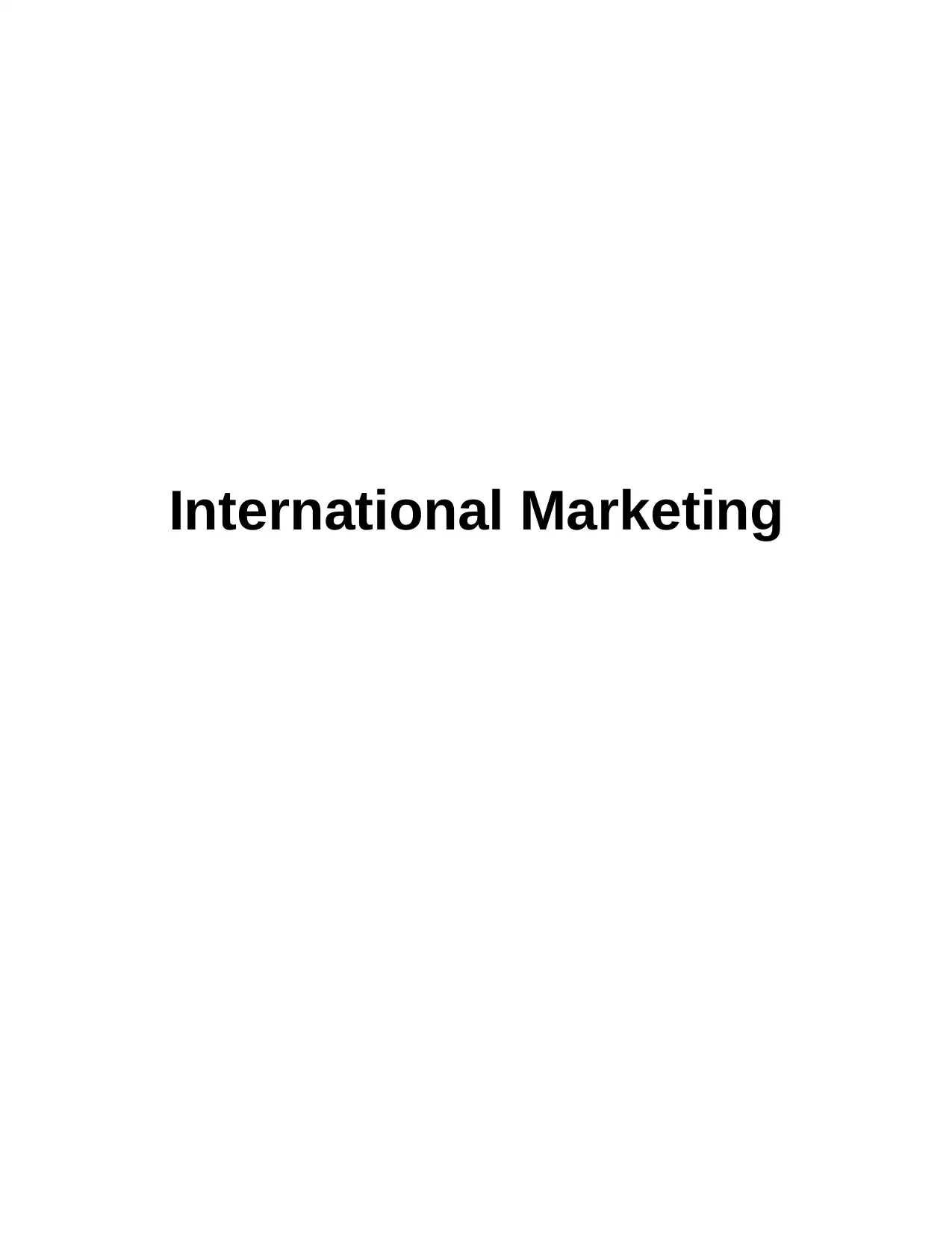
International Marketing
Paraphrase This Document
Need a fresh take? Get an instant paraphrase of this document with our AI Paraphraser
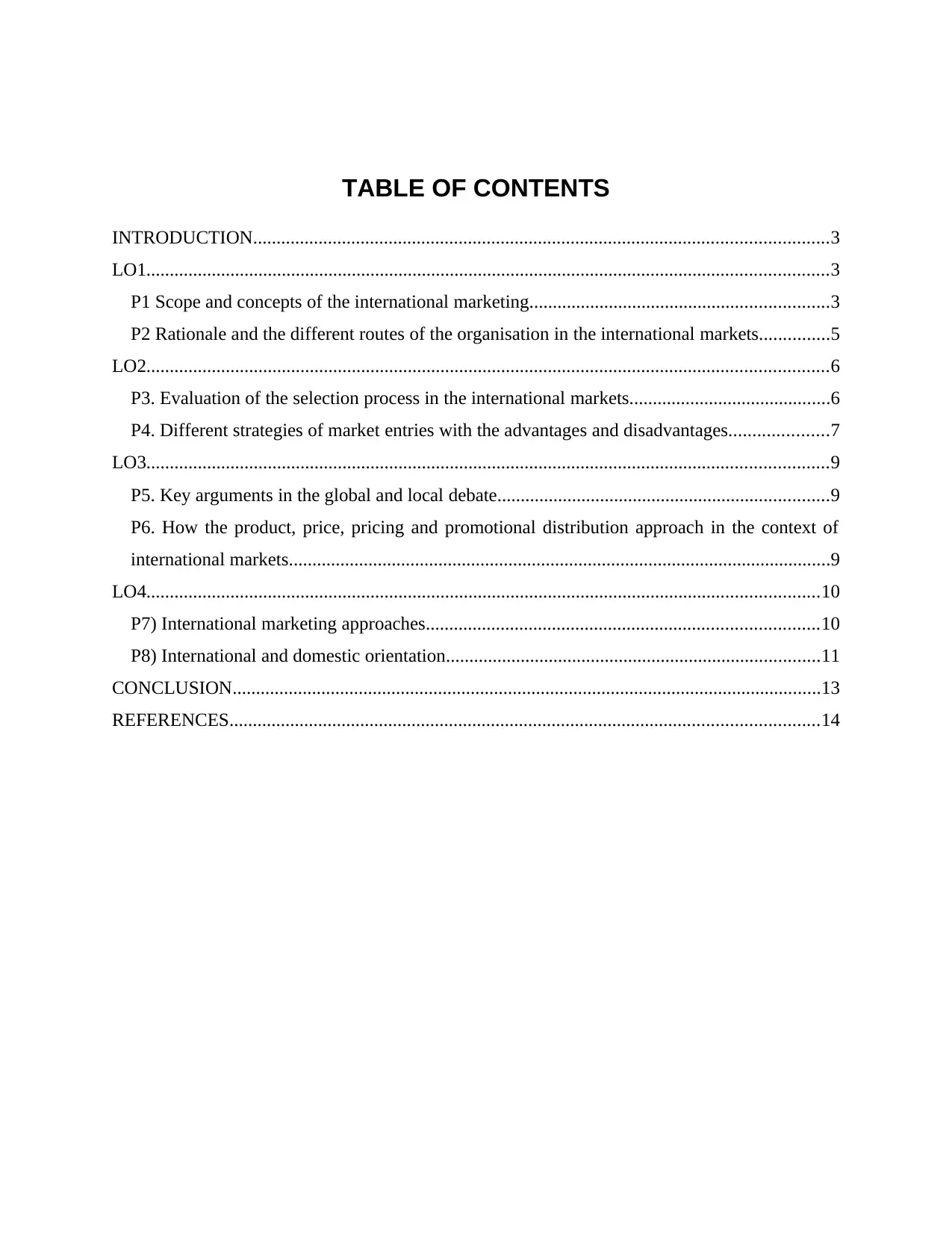
TABLE OF CONTENTS
INTRODUCTION...........................................................................................................................3
LO1..................................................................................................................................................3
P1 Scope and concepts of the international marketing................................................................3
P2 Rationale and the different routes of the organisation in the international markets...............5
LO2..................................................................................................................................................6
P3. Evaluation of the selection process in the international markets...........................................6
P4. Different strategies of market entries with the advantages and disadvantages.....................7
LO3..................................................................................................................................................9
P5. Key arguments in the global and local debate.......................................................................9
P6. How the product, price, pricing and promotional distribution approach in the context of
international markets....................................................................................................................9
LO4................................................................................................................................................10
P7) International marketing approaches....................................................................................10
P8) International and domestic orientation................................................................................11
CONCLUSION..............................................................................................................................13
REFERENCES..............................................................................................................................14
INTRODUCTION...........................................................................................................................3
LO1..................................................................................................................................................3
P1 Scope and concepts of the international marketing................................................................3
P2 Rationale and the different routes of the organisation in the international markets...............5
LO2..................................................................................................................................................6
P3. Evaluation of the selection process in the international markets...........................................6
P4. Different strategies of market entries with the advantages and disadvantages.....................7
LO3..................................................................................................................................................9
P5. Key arguments in the global and local debate.......................................................................9
P6. How the product, price, pricing and promotional distribution approach in the context of
international markets....................................................................................................................9
LO4................................................................................................................................................10
P7) International marketing approaches....................................................................................10
P8) International and domestic orientation................................................................................11
CONCLUSION..............................................................................................................................13
REFERENCES..............................................................................................................................14
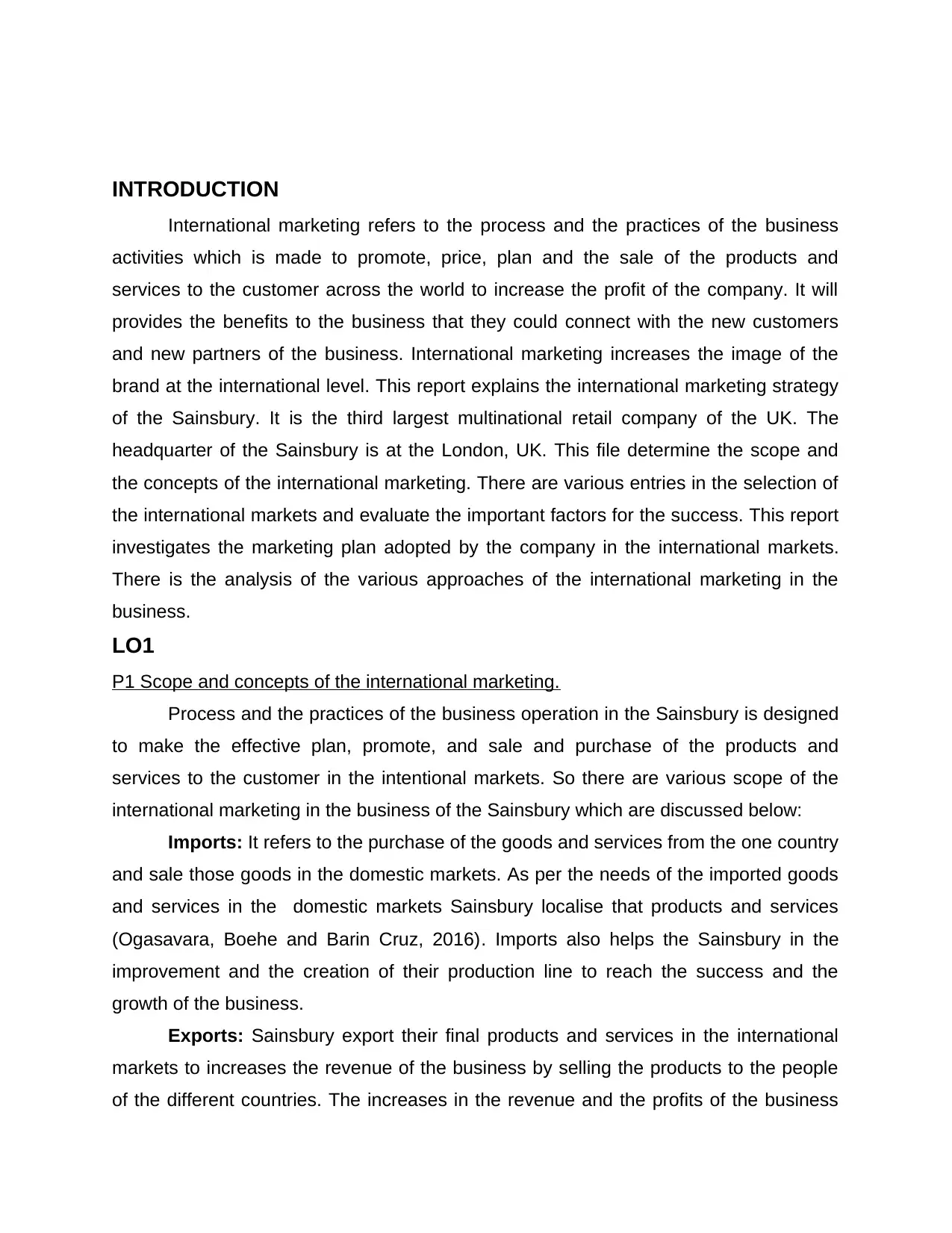
INTRODUCTION
International marketing refers to the process and the practices of the business
activities which is made to promote, price, plan and the sale of the products and
services to the customer across the world to increase the profit of the company. It will
provides the benefits to the business that they could connect with the new customers
and new partners of the business. International marketing increases the image of the
brand at the international level. This report explains the international marketing strategy
of the Sainsbury. It is the third largest multinational retail company of the UK. The
headquarter of the Sainsbury is at the London, UK. This file determine the scope and
the concepts of the international marketing. There are various entries in the selection of
the international markets and evaluate the important factors for the success. This report
investigates the marketing plan adopted by the company in the international markets.
There is the analysis of the various approaches of the international marketing in the
business.
LO1
P1 Scope and concepts of the international marketing.
Process and the practices of the business operation in the Sainsbury is designed
to make the effective plan, promote, and sale and purchase of the products and
services to the customer in the intentional markets. So there are various scope of the
international marketing in the business of the Sainsbury which are discussed below:
Imports: It refers to the purchase of the goods and services from the one country
and sale those goods in the domestic markets. As per the needs of the imported goods
and services in the domestic markets Sainsbury localise that products and services
(Ogasavara, Boehe and Barin Cruz, 2016). Imports also helps the Sainsbury in the
improvement and the creation of their production line to reach the success and the
growth of the business.
Exports: Sainsbury export their final products and services in the international
markets to increases the revenue of the business by selling the products to the people
of the different countries. The increases in the revenue and the profits of the business
International marketing refers to the process and the practices of the business
activities which is made to promote, price, plan and the sale of the products and
services to the customer across the world to increase the profit of the company. It will
provides the benefits to the business that they could connect with the new customers
and new partners of the business. International marketing increases the image of the
brand at the international level. This report explains the international marketing strategy
of the Sainsbury. It is the third largest multinational retail company of the UK. The
headquarter of the Sainsbury is at the London, UK. This file determine the scope and
the concepts of the international marketing. There are various entries in the selection of
the international markets and evaluate the important factors for the success. This report
investigates the marketing plan adopted by the company in the international markets.
There is the analysis of the various approaches of the international marketing in the
business.
LO1
P1 Scope and concepts of the international marketing.
Process and the practices of the business operation in the Sainsbury is designed
to make the effective plan, promote, and sale and purchase of the products and
services to the customer in the intentional markets. So there are various scope of the
international marketing in the business of the Sainsbury which are discussed below:
Imports: It refers to the purchase of the goods and services from the one country
and sale those goods in the domestic markets. As per the needs of the imported goods
and services in the domestic markets Sainsbury localise that products and services
(Ogasavara, Boehe and Barin Cruz, 2016). Imports also helps the Sainsbury in the
improvement and the creation of their production line to reach the success and the
growth of the business.
Exports: Sainsbury export their final products and services in the international
markets to increases the revenue of the business by selling the products to the people
of the different countries. The increases in the revenue and the profits of the business
⊘ This is a preview!⊘
Do you want full access?
Subscribe today to unlock all pages.

Trusted by 1+ million students worldwide
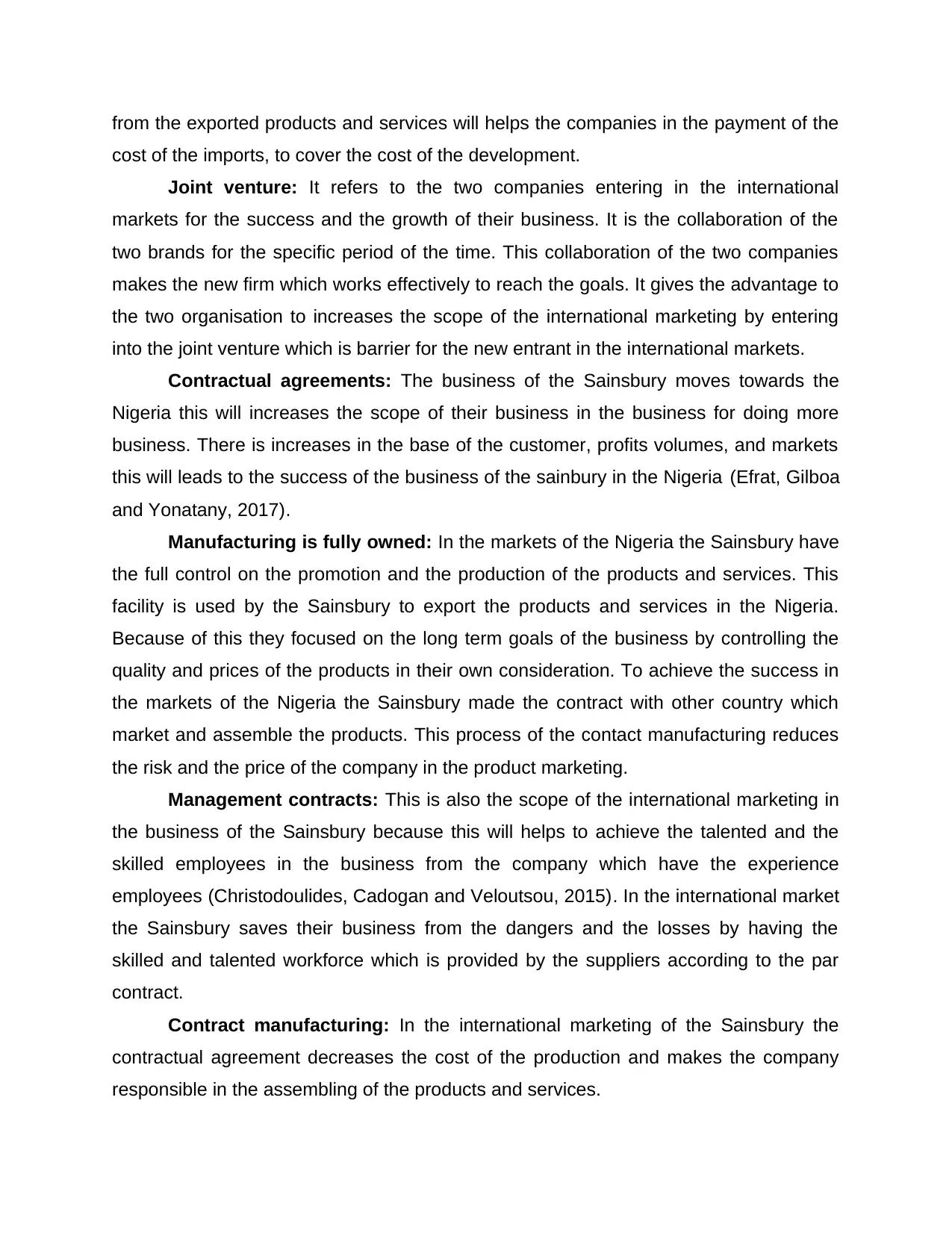
from the exported products and services will helps the companies in the payment of the
cost of the imports, to cover the cost of the development.
Joint venture: It refers to the two companies entering in the international
markets for the success and the growth of their business. It is the collaboration of the
two brands for the specific period of the time. This collaboration of the two companies
makes the new firm which works effectively to reach the goals. It gives the advantage to
the two organisation to increases the scope of the international marketing by entering
into the joint venture which is barrier for the new entrant in the international markets.
Contractual agreements: The business of the Sainsbury moves towards the
Nigeria this will increases the scope of their business in the business for doing more
business. There is increases in the base of the customer, profits volumes, and markets
this will leads to the success of the business of the sainbury in the Nigeria (Efrat, Gilboa
and Yonatany, 2017).
Manufacturing is fully owned: In the markets of the Nigeria the Sainsbury have
the full control on the promotion and the production of the products and services. This
facility is used by the Sainsbury to export the products and services in the Nigeria.
Because of this they focused on the long term goals of the business by controlling the
quality and prices of the products in their own consideration. To achieve the success in
the markets of the Nigeria the Sainsbury made the contract with other country which
market and assemble the products. This process of the contact manufacturing reduces
the risk and the price of the company in the product marketing.
Management contracts: This is also the scope of the international marketing in
the business of the Sainsbury because this will helps to achieve the talented and the
skilled employees in the business from the company which have the experience
employees (Christodoulides, Cadogan and Veloutsou, 2015). In the international market
the Sainsbury saves their business from the dangers and the losses by having the
skilled and talented workforce which is provided by the suppliers according to the par
contract.
Contract manufacturing: In the international marketing of the Sainsbury the
contractual agreement decreases the cost of the production and makes the company
responsible in the assembling of the products and services.
cost of the imports, to cover the cost of the development.
Joint venture: It refers to the two companies entering in the international
markets for the success and the growth of their business. It is the collaboration of the
two brands for the specific period of the time. This collaboration of the two companies
makes the new firm which works effectively to reach the goals. It gives the advantage to
the two organisation to increases the scope of the international marketing by entering
into the joint venture which is barrier for the new entrant in the international markets.
Contractual agreements: The business of the Sainsbury moves towards the
Nigeria this will increases the scope of their business in the business for doing more
business. There is increases in the base of the customer, profits volumes, and markets
this will leads to the success of the business of the sainbury in the Nigeria (Efrat, Gilboa
and Yonatany, 2017).
Manufacturing is fully owned: In the markets of the Nigeria the Sainsbury have
the full control on the promotion and the production of the products and services. This
facility is used by the Sainsbury to export the products and services in the Nigeria.
Because of this they focused on the long term goals of the business by controlling the
quality and prices of the products in their own consideration. To achieve the success in
the markets of the Nigeria the Sainsbury made the contract with other country which
market and assemble the products. This process of the contact manufacturing reduces
the risk and the price of the company in the product marketing.
Management contracts: This is also the scope of the international marketing in
the business of the Sainsbury because this will helps to achieve the talented and the
skilled employees in the business from the company which have the experience
employees (Christodoulides, Cadogan and Veloutsou, 2015). In the international market
the Sainsbury saves their business from the dangers and the losses by having the
skilled and talented workforce which is provided by the suppliers according to the par
contract.
Contract manufacturing: In the international marketing of the Sainsbury the
contractual agreement decreases the cost of the production and makes the company
responsible in the assembling of the products and services.
Paraphrase This Document
Need a fresh take? Get an instant paraphrase of this document with our AI Paraphraser
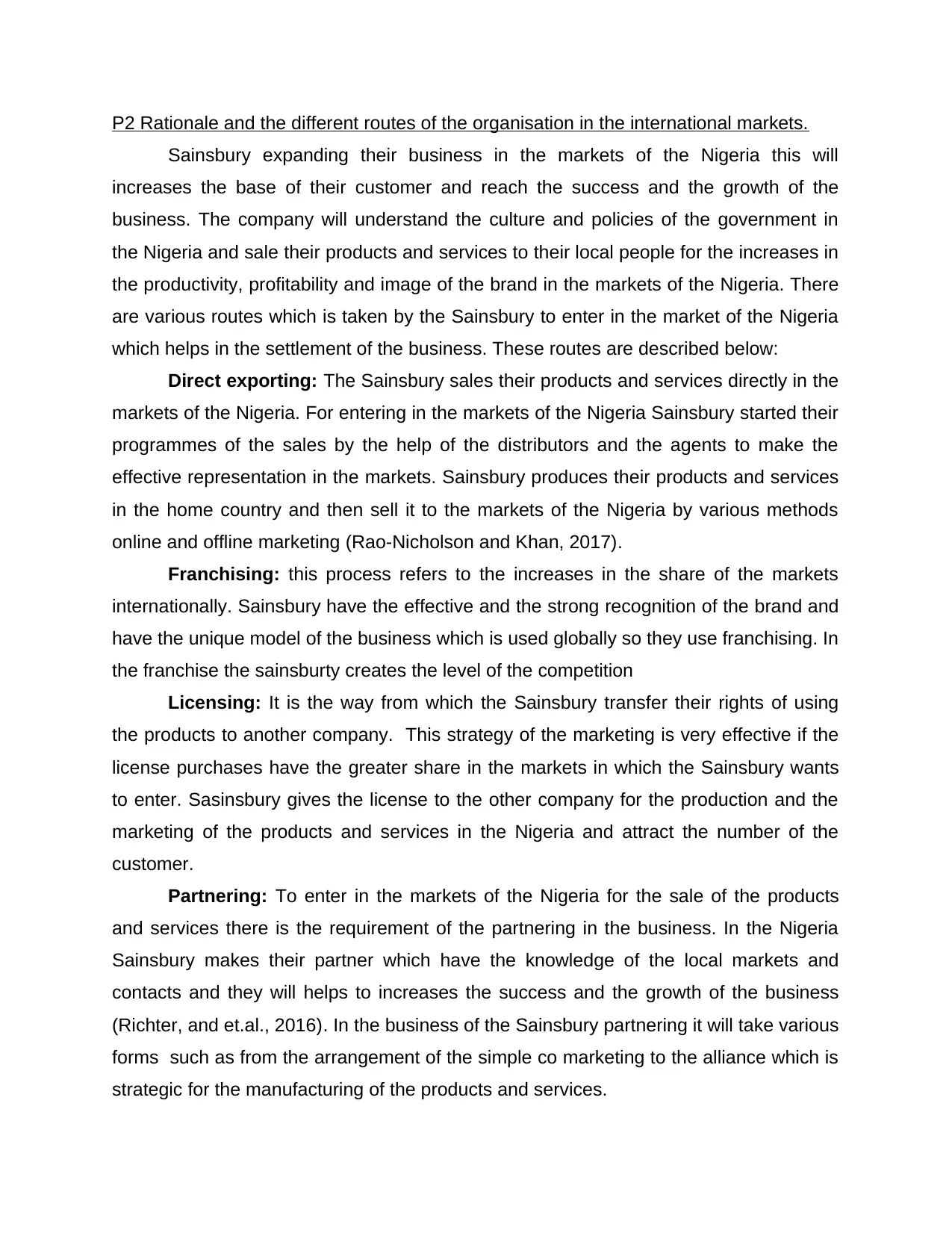
P2 Rationale and the different routes of the organisation in the international markets.
Sainsbury expanding their business in the markets of the Nigeria this will
increases the base of their customer and reach the success and the growth of the
business. The company will understand the culture and policies of the government in
the Nigeria and sale their products and services to their local people for the increases in
the productivity, profitability and image of the brand in the markets of the Nigeria. There
are various routes which is taken by the Sainsbury to enter in the market of the Nigeria
which helps in the settlement of the business. These routes are described below:
Direct exporting: The Sainsbury sales their products and services directly in the
markets of the Nigeria. For entering in the markets of the Nigeria Sainsbury started their
programmes of the sales by the help of the distributors and the agents to make the
effective representation in the markets. Sainsbury produces their products and services
in the home country and then sell it to the markets of the Nigeria by various methods
online and offline marketing (Rao-Nicholson and Khan, 2017).
Franchising: this process refers to the increases in the share of the markets
internationally. Sainsbury have the effective and the strong recognition of the brand and
have the unique model of the business which is used globally so they use franchising. In
the franchise the sainsburty creates the level of the competition
Licensing: It is the way from which the Sainsbury transfer their rights of using
the products to another company. This strategy of the marketing is very effective if the
license purchases have the greater share in the markets in which the Sainsbury wants
to enter. Sasinsbury gives the license to the other company for the production and the
marketing of the products and services in the Nigeria and attract the number of the
customer.
Partnering: To enter in the markets of the Nigeria for the sale of the products
and services there is the requirement of the partnering in the business. In the Nigeria
Sainsbury makes their partner which have the knowledge of the local markets and
contacts and they will helps to increases the success and the growth of the business
(Richter, and et.al., 2016). In the business of the Sainsbury partnering it will take various
forms such as from the arrangement of the simple co marketing to the alliance which is
strategic for the manufacturing of the products and services.
Sainsbury expanding their business in the markets of the Nigeria this will
increases the base of their customer and reach the success and the growth of the
business. The company will understand the culture and policies of the government in
the Nigeria and sale their products and services to their local people for the increases in
the productivity, profitability and image of the brand in the markets of the Nigeria. There
are various routes which is taken by the Sainsbury to enter in the market of the Nigeria
which helps in the settlement of the business. These routes are described below:
Direct exporting: The Sainsbury sales their products and services directly in the
markets of the Nigeria. For entering in the markets of the Nigeria Sainsbury started their
programmes of the sales by the help of the distributors and the agents to make the
effective representation in the markets. Sainsbury produces their products and services
in the home country and then sell it to the markets of the Nigeria by various methods
online and offline marketing (Rao-Nicholson and Khan, 2017).
Franchising: this process refers to the increases in the share of the markets
internationally. Sainsbury have the effective and the strong recognition of the brand and
have the unique model of the business which is used globally so they use franchising. In
the franchise the sainsburty creates the level of the competition
Licensing: It is the way from which the Sainsbury transfer their rights of using
the products to another company. This strategy of the marketing is very effective if the
license purchases have the greater share in the markets in which the Sainsbury wants
to enter. Sasinsbury gives the license to the other company for the production and the
marketing of the products and services in the Nigeria and attract the number of the
customer.
Partnering: To enter in the markets of the Nigeria for the sale of the products
and services there is the requirement of the partnering in the business. In the Nigeria
Sainsbury makes their partner which have the knowledge of the local markets and
contacts and they will helps to increases the success and the growth of the business
(Richter, and et.al., 2016). In the business of the Sainsbury partnering it will take various
forms such as from the arrangement of the simple co marketing to the alliance which is
strategic for the manufacturing of the products and services.
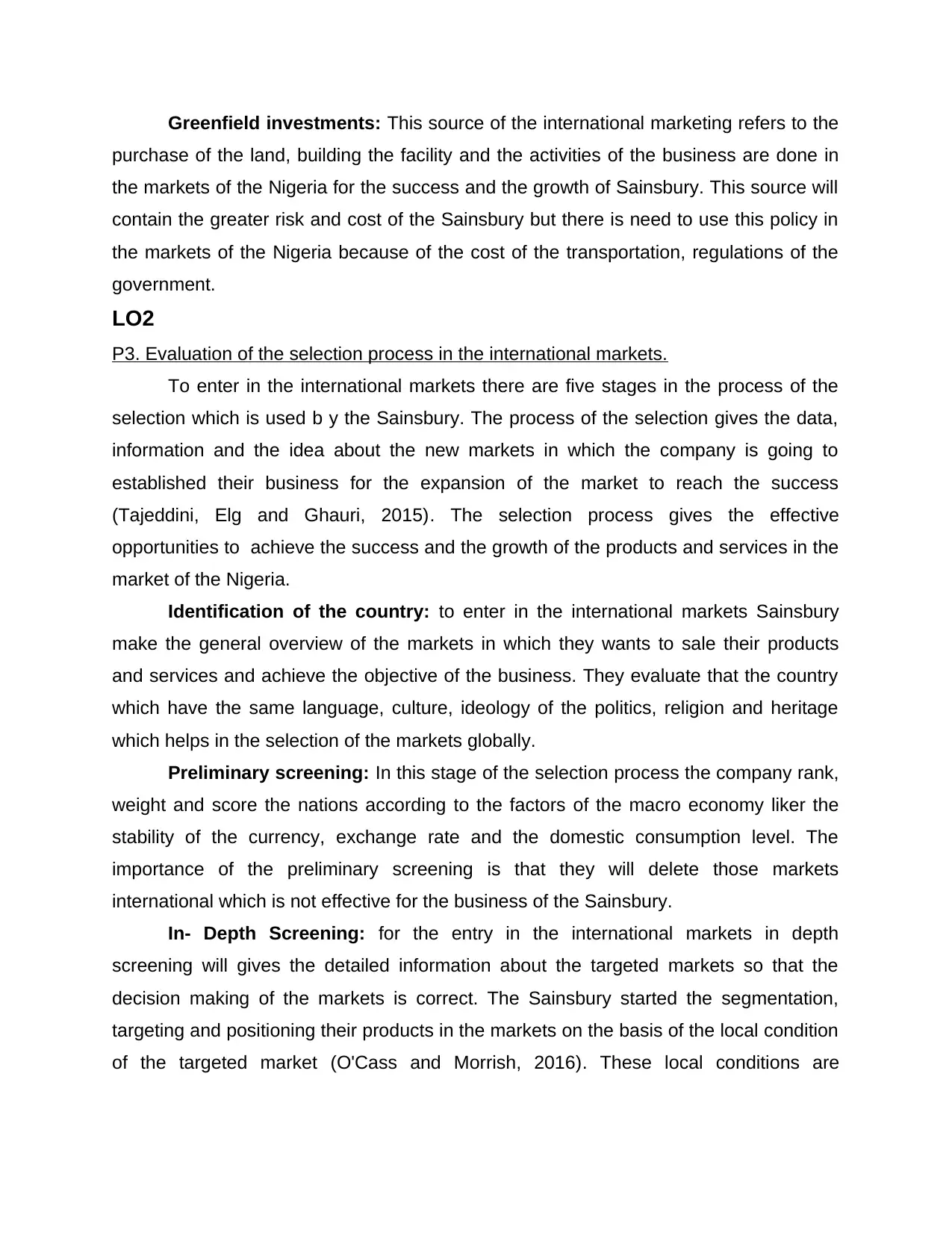
Greenfield investments: This source of the international marketing refers to the
purchase of the land, building the facility and the activities of the business are done in
the markets of the Nigeria for the success and the growth of Sainsbury. This source will
contain the greater risk and cost of the Sainsbury but there is need to use this policy in
the markets of the Nigeria because of the cost of the transportation, regulations of the
government.
LO2
P3. Evaluation of the selection process in the international markets.
To enter in the international markets there are five stages in the process of the
selection which is used b y the Sainsbury. The process of the selection gives the data,
information and the idea about the new markets in which the company is going to
established their business for the expansion of the market to reach the success
(Tajeddini, Elg and Ghauri, 2015). The selection process gives the effective
opportunities to achieve the success and the growth of the products and services in the
market of the Nigeria.
Identification of the country: to enter in the international markets Sainsbury
make the general overview of the markets in which they wants to sale their products
and services and achieve the objective of the business. They evaluate that the country
which have the same language, culture, ideology of the politics, religion and heritage
which helps in the selection of the markets globally.
Preliminary screening: In this stage of the selection process the company rank,
weight and score the nations according to the factors of the macro economy liker the
stability of the currency, exchange rate and the domestic consumption level. The
importance of the preliminary screening is that they will delete those markets
international which is not effective for the business of the Sainsbury.
In- Depth Screening: for the entry in the international markets in depth
screening will gives the detailed information about the targeted markets so that the
decision making of the markets is correct. The Sainsbury started the segmentation,
targeting and positioning their products in the markets on the basis of the local condition
of the targeted market (O'Cass and Morrish, 2016). These local conditions are
purchase of the land, building the facility and the activities of the business are done in
the markets of the Nigeria for the success and the growth of Sainsbury. This source will
contain the greater risk and cost of the Sainsbury but there is need to use this policy in
the markets of the Nigeria because of the cost of the transportation, regulations of the
government.
LO2
P3. Evaluation of the selection process in the international markets.
To enter in the international markets there are five stages in the process of the
selection which is used b y the Sainsbury. The process of the selection gives the data,
information and the idea about the new markets in which the company is going to
established their business for the expansion of the market to reach the success
(Tajeddini, Elg and Ghauri, 2015). The selection process gives the effective
opportunities to achieve the success and the growth of the products and services in the
market of the Nigeria.
Identification of the country: to enter in the international markets Sainsbury
make the general overview of the markets in which they wants to sale their products
and services and achieve the objective of the business. They evaluate that the country
which have the same language, culture, ideology of the politics, religion and heritage
which helps in the selection of the markets globally.
Preliminary screening: In this stage of the selection process the company rank,
weight and score the nations according to the factors of the macro economy liker the
stability of the currency, exchange rate and the domestic consumption level. The
importance of the preliminary screening is that they will delete those markets
international which is not effective for the business of the Sainsbury.
In- Depth Screening: for the entry in the international markets in depth
screening will gives the detailed information about the targeted markets so that the
decision making of the markets is correct. The Sainsbury started the segmentation,
targeting and positioning their products in the markets on the basis of the local condition
of the targeted market (O'Cass and Morrish, 2016). These local conditions are
⊘ This is a preview!⊘
Do you want full access?
Subscribe today to unlock all pages.

Trusted by 1+ million students worldwide
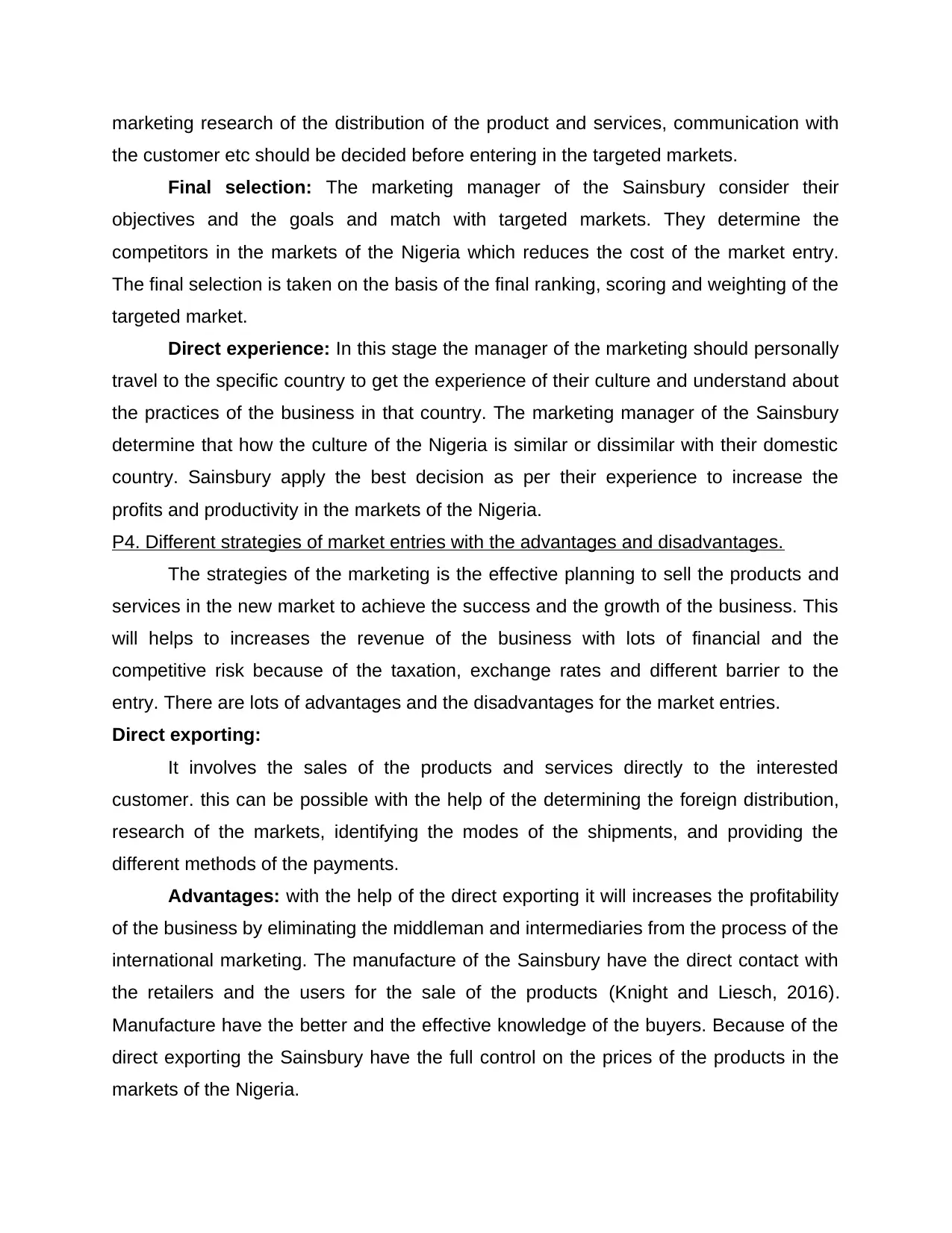
marketing research of the distribution of the product and services, communication with
the customer etc should be decided before entering in the targeted markets.
Final selection: The marketing manager of the Sainsbury consider their
objectives and the goals and match with targeted markets. They determine the
competitors in the markets of the Nigeria which reduces the cost of the market entry.
The final selection is taken on the basis of the final ranking, scoring and weighting of the
targeted market.
Direct experience: In this stage the manager of the marketing should personally
travel to the specific country to get the experience of their culture and understand about
the practices of the business in that country. The marketing manager of the Sainsbury
determine that how the culture of the Nigeria is similar or dissimilar with their domestic
country. Sainsbury apply the best decision as per their experience to increase the
profits and productivity in the markets of the Nigeria.
P4. Different strategies of market entries with the advantages and disadvantages.
The strategies of the marketing is the effective planning to sell the products and
services in the new market to achieve the success and the growth of the business. This
will helps to increases the revenue of the business with lots of financial and the
competitive risk because of the taxation, exchange rates and different barrier to the
entry. There are lots of advantages and the disadvantages for the market entries.
Direct exporting:
It involves the sales of the products and services directly to the interested
customer. this can be possible with the help of the determining the foreign distribution,
research of the markets, identifying the modes of the shipments, and providing the
different methods of the payments.
Advantages: with the help of the direct exporting it will increases the profitability
of the business by eliminating the middleman and intermediaries from the process of the
international marketing. The manufacture of the Sainsbury have the direct contact with
the retailers and the users for the sale of the products (Knight and Liesch, 2016).
Manufacture have the better and the effective knowledge of the buyers. Because of the
direct exporting the Sainsbury have the full control on the prices of the products in the
markets of the Nigeria.
the customer etc should be decided before entering in the targeted markets.
Final selection: The marketing manager of the Sainsbury consider their
objectives and the goals and match with targeted markets. They determine the
competitors in the markets of the Nigeria which reduces the cost of the market entry.
The final selection is taken on the basis of the final ranking, scoring and weighting of the
targeted market.
Direct experience: In this stage the manager of the marketing should personally
travel to the specific country to get the experience of their culture and understand about
the practices of the business in that country. The marketing manager of the Sainsbury
determine that how the culture of the Nigeria is similar or dissimilar with their domestic
country. Sainsbury apply the best decision as per their experience to increase the
profits and productivity in the markets of the Nigeria.
P4. Different strategies of market entries with the advantages and disadvantages.
The strategies of the marketing is the effective planning to sell the products and
services in the new market to achieve the success and the growth of the business. This
will helps to increases the revenue of the business with lots of financial and the
competitive risk because of the taxation, exchange rates and different barrier to the
entry. There are lots of advantages and the disadvantages for the market entries.
Direct exporting:
It involves the sales of the products and services directly to the interested
customer. this can be possible with the help of the determining the foreign distribution,
research of the markets, identifying the modes of the shipments, and providing the
different methods of the payments.
Advantages: with the help of the direct exporting it will increases the profitability
of the business by eliminating the middleman and intermediaries from the process of the
international marketing. The manufacture of the Sainsbury have the direct contact with
the retailers and the users for the sale of the products (Knight and Liesch, 2016).
Manufacture have the better and the effective knowledge of the buyers. Because of the
direct exporting the Sainsbury have the full control on the prices of the products in the
markets of the Nigeria.
Paraphrase This Document
Need a fresh take? Get an instant paraphrase of this document with our AI Paraphraser
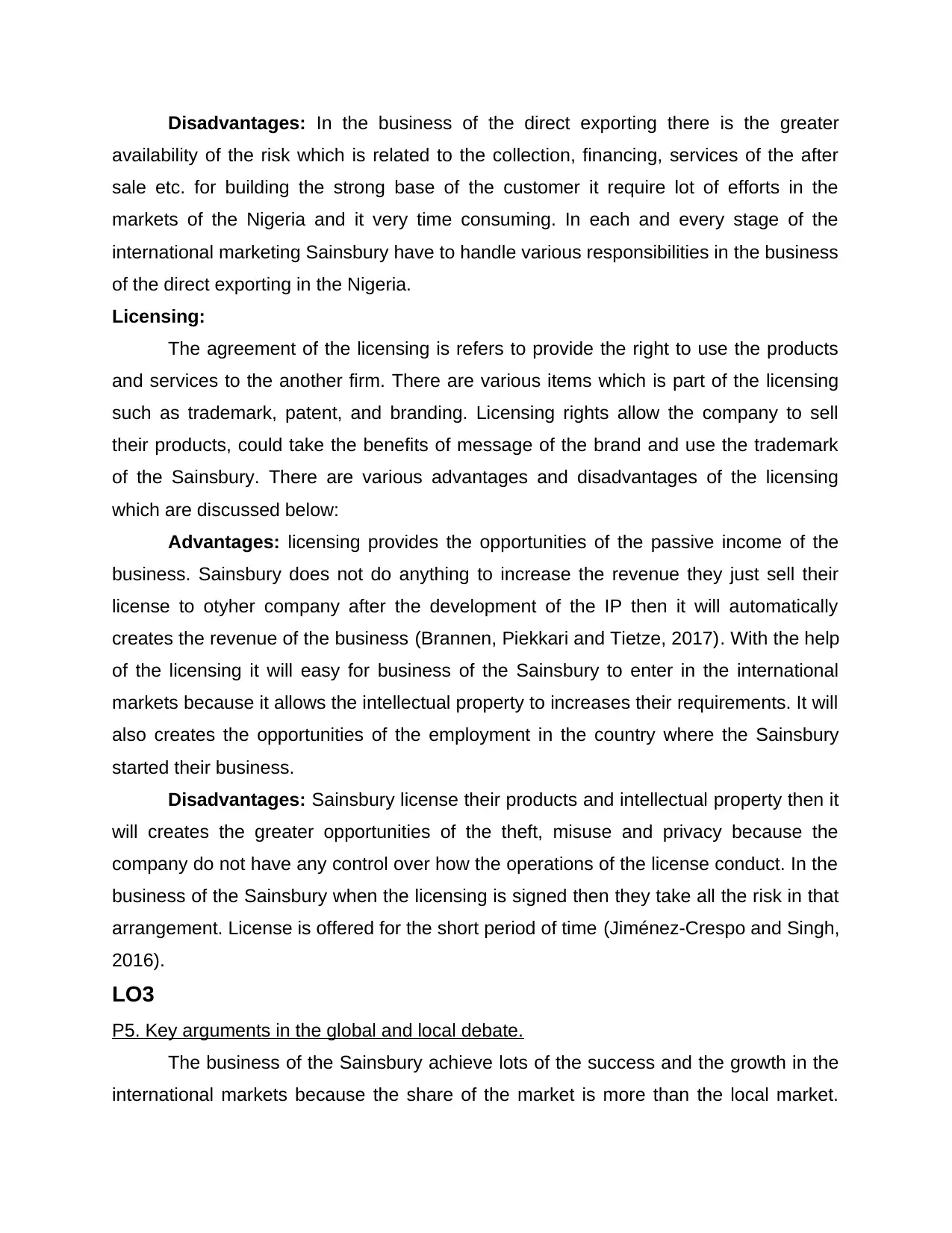
Disadvantages: In the business of the direct exporting there is the greater
availability of the risk which is related to the collection, financing, services of the after
sale etc. for building the strong base of the customer it require lot of efforts in the
markets of the Nigeria and it very time consuming. In each and every stage of the
international marketing Sainsbury have to handle various responsibilities in the business
of the direct exporting in the Nigeria.
Licensing:
The agreement of the licensing is refers to provide the right to use the products
and services to the another firm. There are various items which is part of the licensing
such as trademark, patent, and branding. Licensing rights allow the company to sell
their products, could take the benefits of message of the brand and use the trademark
of the Sainsbury. There are various advantages and disadvantages of the licensing
which are discussed below:
Advantages: licensing provides the opportunities of the passive income of the
business. Sainsbury does not do anything to increase the revenue they just sell their
license to otyher company after the development of the IP then it will automatically
creates the revenue of the business (Brannen, Piekkari and Tietze, 2017). With the help
of the licensing it will easy for business of the Sainsbury to enter in the international
markets because it allows the intellectual property to increases their requirements. It will
also creates the opportunities of the employment in the country where the Sainsbury
started their business.
Disadvantages: Sainsbury license their products and intellectual property then it
will creates the greater opportunities of the theft, misuse and privacy because the
company do not have any control over how the operations of the license conduct. In the
business of the Sainsbury when the licensing is signed then they take all the risk in that
arrangement. License is offered for the short period of time (Jiménez-Crespo and Singh,
2016).
LO3
P5. Key arguments in the global and local debate.
The business of the Sainsbury achieve lots of the success and the growth in the
international markets because the share of the market is more than the local market.
availability of the risk which is related to the collection, financing, services of the after
sale etc. for building the strong base of the customer it require lot of efforts in the
markets of the Nigeria and it very time consuming. In each and every stage of the
international marketing Sainsbury have to handle various responsibilities in the business
of the direct exporting in the Nigeria.
Licensing:
The agreement of the licensing is refers to provide the right to use the products
and services to the another firm. There are various items which is part of the licensing
such as trademark, patent, and branding. Licensing rights allow the company to sell
their products, could take the benefits of message of the brand and use the trademark
of the Sainsbury. There are various advantages and disadvantages of the licensing
which are discussed below:
Advantages: licensing provides the opportunities of the passive income of the
business. Sainsbury does not do anything to increase the revenue they just sell their
license to otyher company after the development of the IP then it will automatically
creates the revenue of the business (Brannen, Piekkari and Tietze, 2017). With the help
of the licensing it will easy for business of the Sainsbury to enter in the international
markets because it allows the intellectual property to increases their requirements. It will
also creates the opportunities of the employment in the country where the Sainsbury
started their business.
Disadvantages: Sainsbury license their products and intellectual property then it
will creates the greater opportunities of the theft, misuse and privacy because the
company do not have any control over how the operations of the license conduct. In the
business of the Sainsbury when the licensing is signed then they take all the risk in that
arrangement. License is offered for the short period of time (Jiménez-Crespo and Singh,
2016).
LO3
P5. Key arguments in the global and local debate.
The business of the Sainsbury achieve lots of the success and the growth in the
international markets because the share of the market is more than the local market.
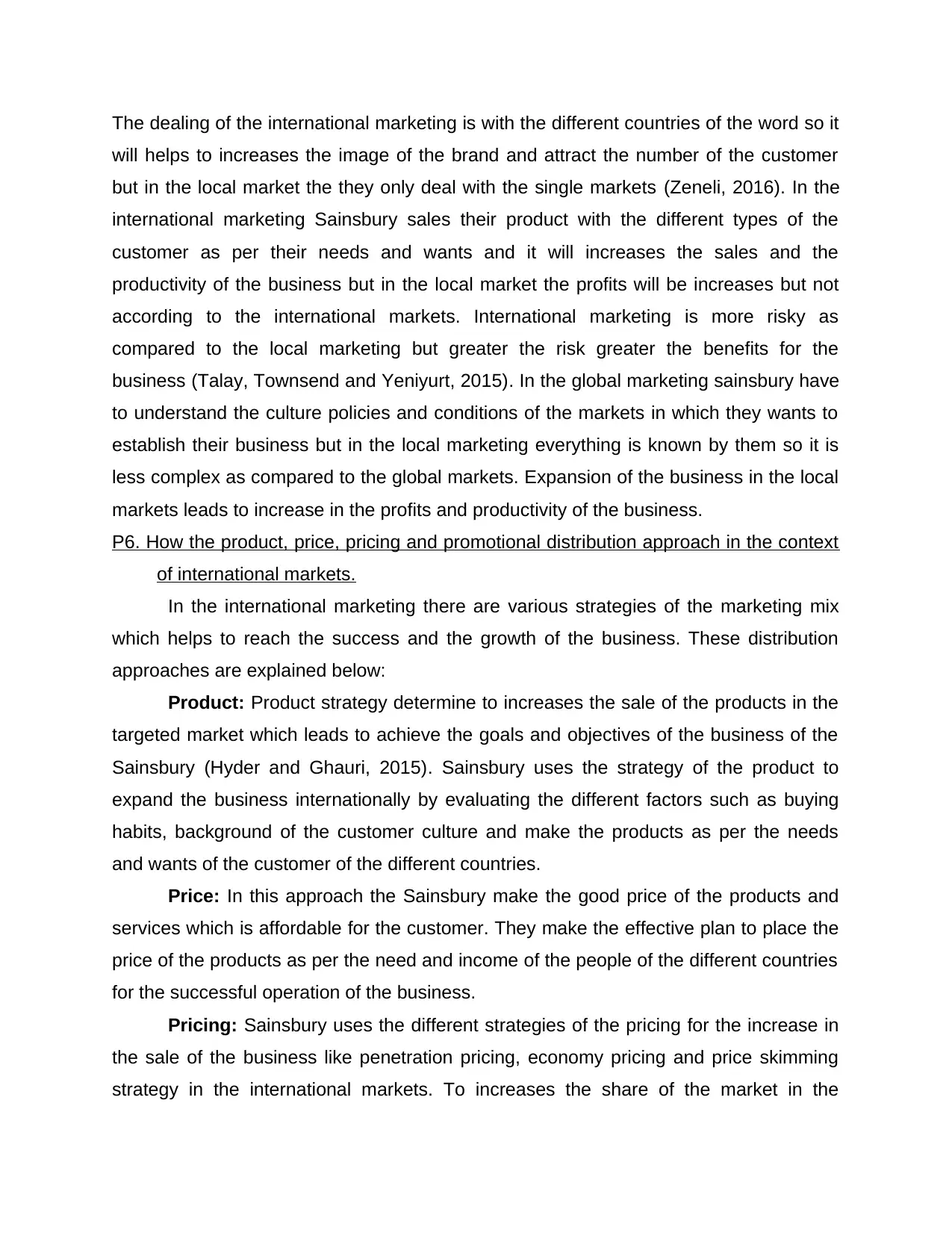
The dealing of the international marketing is with the different countries of the word so it
will helps to increases the image of the brand and attract the number of the customer
but in the local market the they only deal with the single markets (Zeneli, 2016). In the
international marketing Sainsbury sales their product with the different types of the
customer as per their needs and wants and it will increases the sales and the
productivity of the business but in the local market the profits will be increases but not
according to the international markets. International marketing is more risky as
compared to the local marketing but greater the risk greater the benefits for the
business (Talay, Townsend and Yeniyurt, 2015). In the global marketing sainsbury have
to understand the culture policies and conditions of the markets in which they wants to
establish their business but in the local marketing everything is known by them so it is
less complex as compared to the global markets. Expansion of the business in the local
markets leads to increase in the profits and productivity of the business.
P6. How the product, price, pricing and promotional distribution approach in the context
of international markets.
In the international marketing there are various strategies of the marketing mix
which helps to reach the success and the growth of the business. These distribution
approaches are explained below:
Product: Product strategy determine to increases the sale of the products in the
targeted market which leads to achieve the goals and objectives of the business of the
Sainsbury (Hyder and Ghauri, 2015). Sainsbury uses the strategy of the product to
expand the business internationally by evaluating the different factors such as buying
habits, background of the customer culture and make the products as per the needs
and wants of the customer of the different countries.
Price: In this approach the Sainsbury make the good price of the products and
services which is affordable for the customer. They make the effective plan to place the
price of the products as per the need and income of the people of the different countries
for the successful operation of the business.
Pricing: Sainsbury uses the different strategies of the pricing for the increase in
the sale of the business like penetration pricing, economy pricing and price skimming
strategy in the international markets. To increases the share of the market in the
will helps to increases the image of the brand and attract the number of the customer
but in the local market the they only deal with the single markets (Zeneli, 2016). In the
international marketing Sainsbury sales their product with the different types of the
customer as per their needs and wants and it will increases the sales and the
productivity of the business but in the local market the profits will be increases but not
according to the international markets. International marketing is more risky as
compared to the local marketing but greater the risk greater the benefits for the
business (Talay, Townsend and Yeniyurt, 2015). In the global marketing sainsbury have
to understand the culture policies and conditions of the markets in which they wants to
establish their business but in the local marketing everything is known by them so it is
less complex as compared to the global markets. Expansion of the business in the local
markets leads to increase in the profits and productivity of the business.
P6. How the product, price, pricing and promotional distribution approach in the context
of international markets.
In the international marketing there are various strategies of the marketing mix
which helps to reach the success and the growth of the business. These distribution
approaches are explained below:
Product: Product strategy determine to increases the sale of the products in the
targeted market which leads to achieve the goals and objectives of the business of the
Sainsbury (Hyder and Ghauri, 2015). Sainsbury uses the strategy of the product to
expand the business internationally by evaluating the different factors such as buying
habits, background of the customer culture and make the products as per the needs
and wants of the customer of the different countries.
Price: In this approach the Sainsbury make the good price of the products and
services which is affordable for the customer. They make the effective plan to place the
price of the products as per the need and income of the people of the different countries
for the successful operation of the business.
Pricing: Sainsbury uses the different strategies of the pricing for the increase in
the sale of the business like penetration pricing, economy pricing and price skimming
strategy in the international markets. To increases the share of the market in the
⊘ This is a preview!⊘
Do you want full access?
Subscribe today to unlock all pages.

Trusted by 1+ million students worldwide
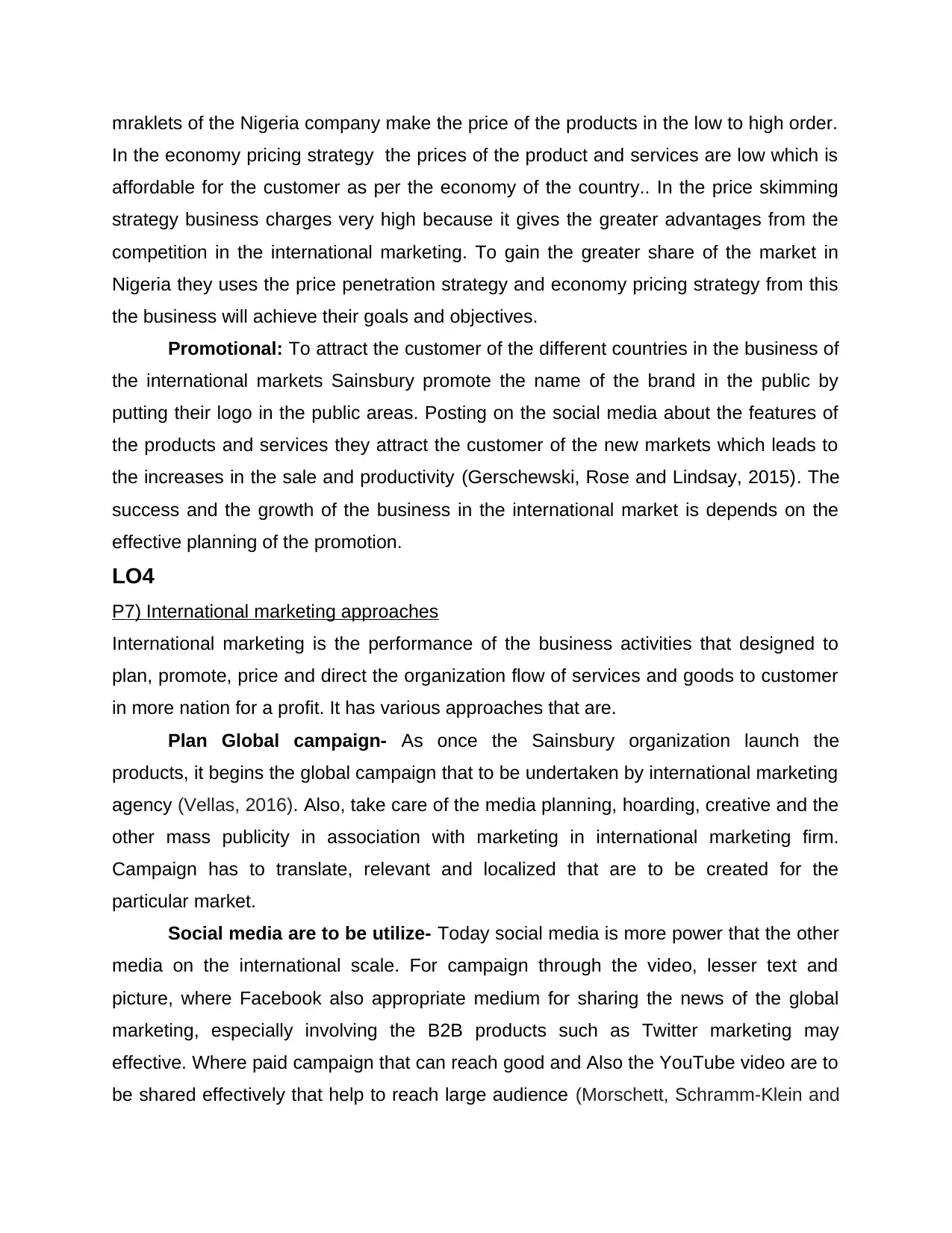
mraklets of the Nigeria company make the price of the products in the low to high order.
In the economy pricing strategy the prices of the product and services are low which is
affordable for the customer as per the economy of the country.. In the price skimming
strategy business charges very high because it gives the greater advantages from the
competition in the international marketing. To gain the greater share of the market in
Nigeria they uses the price penetration strategy and economy pricing strategy from this
the business will achieve their goals and objectives.
Promotional: To attract the customer of the different countries in the business of
the international markets Sainsbury promote the name of the brand in the public by
putting their logo in the public areas. Posting on the social media about the features of
the products and services they attract the customer of the new markets which leads to
the increases in the sale and productivity (Gerschewski, Rose and Lindsay, 2015). The
success and the growth of the business in the international market is depends on the
effective planning of the promotion.
LO4
P7) International marketing approaches
International marketing is the performance of the business activities that designed to
plan, promote, price and direct the organization flow of services and goods to customer
in more nation for a profit. It has various approaches that are.
Plan Global campaign- As once the Sainsbury organization launch the
products, it begins the global campaign that to be undertaken by international marketing
agency (Vellas, 2016). Also, take care of the media planning, hoarding, creative and the
other mass publicity in association with marketing in international marketing firm.
Campaign has to translate, relevant and localized that are to be created for the
particular market.
Social media are to be utilize- Today social media is more power that the other
media on the international scale. For campaign through the video, lesser text and
picture, where Facebook also appropriate medium for sharing the news of the global
marketing, especially involving the B2B products such as Twitter marketing may
effective. Where paid campaign that can reach good and Also the YouTube video are to
be shared effectively that help to reach large audience (Morschett, Schramm-Klein and
In the economy pricing strategy the prices of the product and services are low which is
affordable for the customer as per the economy of the country.. In the price skimming
strategy business charges very high because it gives the greater advantages from the
competition in the international marketing. To gain the greater share of the market in
Nigeria they uses the price penetration strategy and economy pricing strategy from this
the business will achieve their goals and objectives.
Promotional: To attract the customer of the different countries in the business of
the international markets Sainsbury promote the name of the brand in the public by
putting their logo in the public areas. Posting on the social media about the features of
the products and services they attract the customer of the new markets which leads to
the increases in the sale and productivity (Gerschewski, Rose and Lindsay, 2015). The
success and the growth of the business in the international market is depends on the
effective planning of the promotion.
LO4
P7) International marketing approaches
International marketing is the performance of the business activities that designed to
plan, promote, price and direct the organization flow of services and goods to customer
in more nation for a profit. It has various approaches that are.
Plan Global campaign- As once the Sainsbury organization launch the
products, it begins the global campaign that to be undertaken by international marketing
agency (Vellas, 2016). Also, take care of the media planning, hoarding, creative and the
other mass publicity in association with marketing in international marketing firm.
Campaign has to translate, relevant and localized that are to be created for the
particular market.
Social media are to be utilize- Today social media is more power that the other
media on the international scale. For campaign through the video, lesser text and
picture, where Facebook also appropriate medium for sharing the news of the global
marketing, especially involving the B2B products such as Twitter marketing may
effective. Where paid campaign that can reach good and Also the YouTube video are to
be shared effectively that help to reach large audience (Morschett, Schramm-Klein and
Paraphrase This Document
Need a fresh take? Get an instant paraphrase of this document with our AI Paraphraser
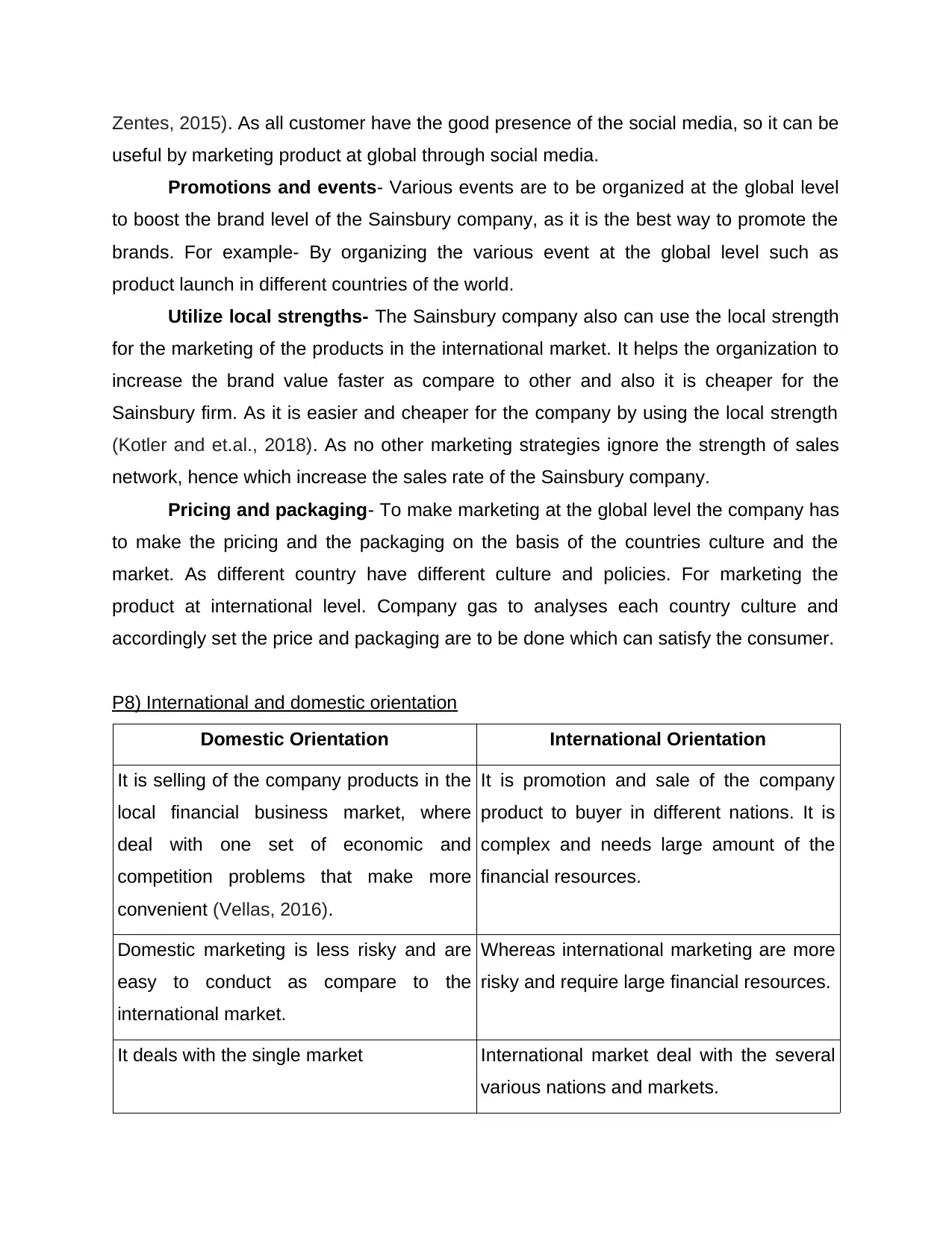
Zentes, 2015). As all customer have the good presence of the social media, so it can be
useful by marketing product at global through social media.
Promotions and events- Various events are to be organized at the global level
to boost the brand level of the Sainsbury company, as it is the best way to promote the
brands. For example- By organizing the various event at the global level such as
product launch in different countries of the world.
Utilize local strengths- The Sainsbury company also can use the local strength
for the marketing of the products in the international market. It helps the organization to
increase the brand value faster as compare to other and also it is cheaper for the
Sainsbury firm. As it is easier and cheaper for the company by using the local strength
(Kotler and et.al., 2018). As no other marketing strategies ignore the strength of sales
network, hence which increase the sales rate of the Sainsbury company.
Pricing and packaging- To make marketing at the global level the company has
to make the pricing and the packaging on the basis of the countries culture and the
market. As different country have different culture and policies. For marketing the
product at international level. Company gas to analyses each country culture and
accordingly set the price and packaging are to be done which can satisfy the consumer.
P8) International and domestic orientation
Domestic Orientation International Orientation
It is selling of the company products in the
local financial business market, where
deal with one set of economic and
competition problems that make more
convenient (Vellas, 2016).
It is promotion and sale of the company
product to buyer in different nations. It is
complex and needs large amount of the
financial resources.
Domestic marketing is less risky and are
easy to conduct as compare to the
international market.
Whereas international marketing are more
risky and require large financial resources.
It deals with the single market International market deal with the several
various nations and markets.
useful by marketing product at global through social media.
Promotions and events- Various events are to be organized at the global level
to boost the brand level of the Sainsbury company, as it is the best way to promote the
brands. For example- By organizing the various event at the global level such as
product launch in different countries of the world.
Utilize local strengths- The Sainsbury company also can use the local strength
for the marketing of the products in the international market. It helps the organization to
increase the brand value faster as compare to other and also it is cheaper for the
Sainsbury firm. As it is easier and cheaper for the company by using the local strength
(Kotler and et.al., 2018). As no other marketing strategies ignore the strength of sales
network, hence which increase the sales rate of the Sainsbury company.
Pricing and packaging- To make marketing at the global level the company has
to make the pricing and the packaging on the basis of the countries culture and the
market. As different country have different culture and policies. For marketing the
product at international level. Company gas to analyses each country culture and
accordingly set the price and packaging are to be done which can satisfy the consumer.
P8) International and domestic orientation
Domestic Orientation International Orientation
It is selling of the company products in the
local financial business market, where
deal with one set of economic and
competition problems that make more
convenient (Vellas, 2016).
It is promotion and sale of the company
product to buyer in different nations. It is
complex and needs large amount of the
financial resources.
Domestic marketing is less risky and are
easy to conduct as compare to the
international market.
Whereas international marketing are more
risky and require large financial resources.
It deals with the single market International market deal with the several
various nations and markets.
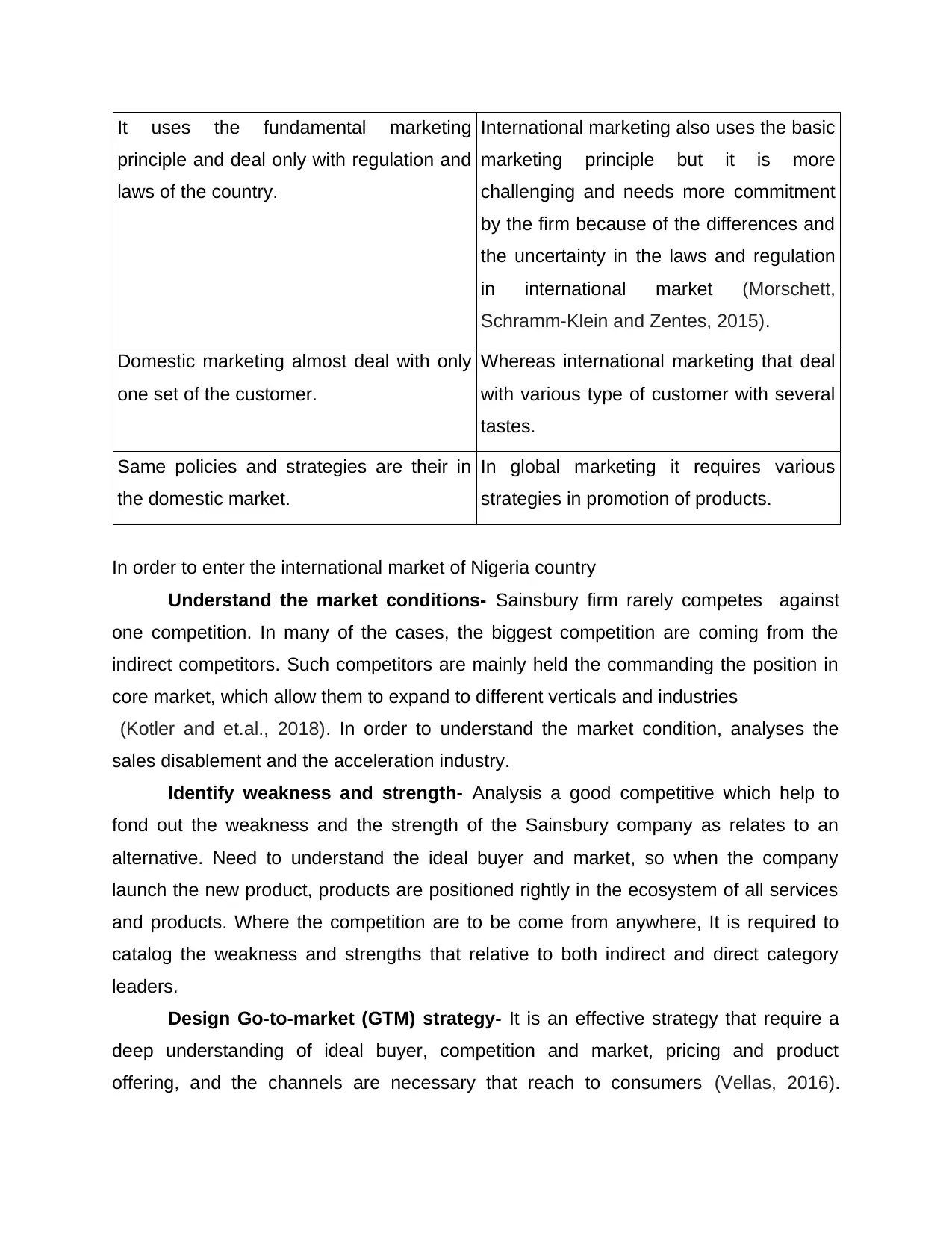
It uses the fundamental marketing
principle and deal only with regulation and
laws of the country.
International marketing also uses the basic
marketing principle but it is more
challenging and needs more commitment
by the firm because of the differences and
the uncertainty in the laws and regulation
in international market (Morschett,
Schramm-Klein and Zentes, 2015).
Domestic marketing almost deal with only
one set of the customer.
Whereas international marketing that deal
with various type of customer with several
tastes.
Same policies and strategies are their in
the domestic market.
In global marketing it requires various
strategies in promotion of products.
In order to enter the international market of Nigeria country
Understand the market conditions- Sainsbury firm rarely competes against
one competition. In many of the cases, the biggest competition are coming from the
indirect competitors. Such competitors are mainly held the commanding the position in
core market, which allow them to expand to different verticals and industries
(Kotler and et.al., 2018). In order to understand the market condition, analyses the
sales disablement and the acceleration industry.
Identify weakness and strength- Analysis a good competitive which help to
fond out the weakness and the strength of the Sainsbury company as relates to an
alternative. Need to understand the ideal buyer and market, so when the company
launch the new product, products are positioned rightly in the ecosystem of all services
and products. Where the competition are to be come from anywhere, It is required to
catalog the weakness and strengths that relative to both indirect and direct category
leaders.
Design Go-to-market (GTM) strategy- It is an effective strategy that require a
deep understanding of ideal buyer, competition and market, pricing and product
offering, and the channels are necessary that reach to consumers (Vellas, 2016).
principle and deal only with regulation and
laws of the country.
International marketing also uses the basic
marketing principle but it is more
challenging and needs more commitment
by the firm because of the differences and
the uncertainty in the laws and regulation
in international market (Morschett,
Schramm-Klein and Zentes, 2015).
Domestic marketing almost deal with only
one set of the customer.
Whereas international marketing that deal
with various type of customer with several
tastes.
Same policies and strategies are their in
the domestic market.
In global marketing it requires various
strategies in promotion of products.
In order to enter the international market of Nigeria country
Understand the market conditions- Sainsbury firm rarely competes against
one competition. In many of the cases, the biggest competition are coming from the
indirect competitors. Such competitors are mainly held the commanding the position in
core market, which allow them to expand to different verticals and industries
(Kotler and et.al., 2018). In order to understand the market condition, analyses the
sales disablement and the acceleration industry.
Identify weakness and strength- Analysis a good competitive which help to
fond out the weakness and the strength of the Sainsbury company as relates to an
alternative. Need to understand the ideal buyer and market, so when the company
launch the new product, products are positioned rightly in the ecosystem of all services
and products. Where the competition are to be come from anywhere, It is required to
catalog the weakness and strengths that relative to both indirect and direct category
leaders.
Design Go-to-market (GTM) strategy- It is an effective strategy that require a
deep understanding of ideal buyer, competition and market, pricing and product
offering, and the channels are necessary that reach to consumers (Vellas, 2016).
⊘ This is a preview!⊘
Do you want full access?
Subscribe today to unlock all pages.

Trusted by 1+ million students worldwide
1 out of 15
Related Documents
Your All-in-One AI-Powered Toolkit for Academic Success.
+13062052269
info@desklib.com
Available 24*7 on WhatsApp / Email
![[object Object]](/_next/static/media/star-bottom.7253800d.svg)
Unlock your academic potential
Copyright © 2020–2026 A2Z Services. All Rights Reserved. Developed and managed by ZUCOL.





